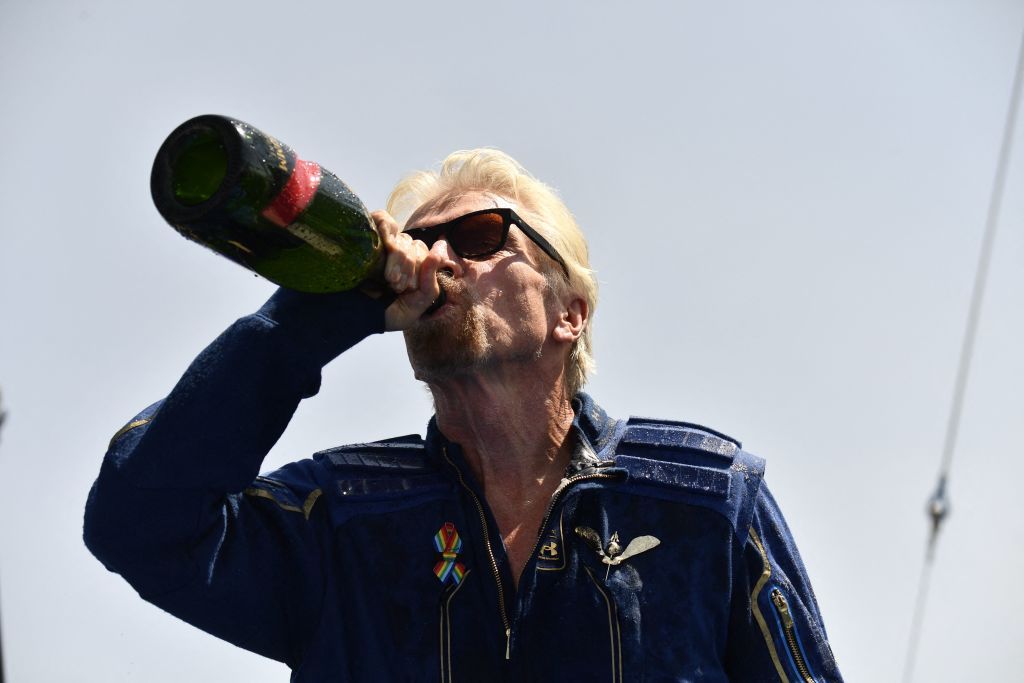In bedrooms across the country, women are wearing £145 sexy silk chemises emblazoned with jewels spelling out the words ‘Ban Space Travel’.
This isn’t just a bit tacky or part of a new kink. It’s a sign of growing cynicism around space exploration. (Another item in the same collection, sold by luxury underwear company Bluebella, casually calls for ‘world peace,’ as though the two issues are akin.)
Bluebella’s CEO Emily Bendell says the garment, designed by Ashish Gupta, is a ‘cultural statement’. ‘With so many problems here on earth, we have to hold billionaires focused on space exploration to account,’ she says. It is unclear exactly how much holding to account exactly lace-trimmed camisoles can do.
But this movement goes far beyond the bedroom. Prince William, for instance, expressed a similar sentiment when he said great brains should be ‘trying to repair this planet, not trying to find the next place to go and live.’
Meanwhile, a 20,000-participant-strong report conducted by satellite provider Inmarsat found that only 23 per cent of people feel space exploration is ‘important,’ with younger generations feeling particularly concerned about its environmental impact.
Professor Anu Ojha, who is the director of championing space at the UK Space Agency, gives a wry chuckle at the underwear. He says it shows only that experts need to do better at communicating the benefits of space to the general public. ‘Space is critical for monitoring the environment, weather forecasting, and disaster management. More than half of climate change you can only measure in real time from space.’ he says.
Although launching a rocket may cost the equivalent of around 400 flights in fuel, in a world where 1,300 flights take off and land in Heathrow per day, ‘it’s a small part of a big problem’. ‘The UK has a leading reputation in trying to push what we are calling “space sustainability,”’ he adds.
Ian Crawford, Professor of planetary science and astrobiology at Birkbeck, is similarly robust in his defence of space exploration and unease around calls to ‘ban space travel’. ‘If Prince William or anyone else is going to start saying: “Well, we’ve got all of these problems on the earth, why are we spending all this money on space exploration?” That is a valid point but it also has to apply to everything else that society spends money on – and some of these things are more dangerous and less useful than space exploration. There’s a bigger perspective there that has to be grasped before people start putting memes on t-shirts.’
‘There’s a bigger perspective there that has to be grasped before people start putting memes on t-shirts’
Professor Crawford points to the fact that satellites can map deforestation in the Amazon, monitor methane levels and are essential in pinpointing polluting areas of the planet.
But it’s not all about environmental concerns. Billionaires and the A-listers are giving space a bad rep too. Some celebrities are just saying silly things: Take Joan Collins, who criticised fellow actor William Shatner for taking a space flight. She called him a ‘fool’ before wheeling out the now familiar line: ‘Let’s take care of this planet first before we start going off [into space].’
Other stars, such as singer Justin Bieber and actor Leonardo DiCaprio, have purchased tickets for the SpaceShip Two Virgin Galactic flight, as though Mars is just the new Mustique. Billionaires like Musk and Bezos are, as Professor Anu Ojha points out, making some people ask the question: ‘Is this just a playground for the rich elites?’
Professor Crawford says their input should not be dismissed, but that it’s certainly no reason to initiate a ban. ‘There are lots of billionaires who we never hear of who are just happy to spend all their money on their own personal pleasures, like their super yachts and millions of houses, doing nothing constructive. Whatever you say about people like Musk, he is actually employing a lot of people and his Space X activity is helpful in reducing costs of access to space.’
Space travel, Professor Ojha points out, helps countries become richer. He says £360 billion of annual UK economic activity could not happen without space services. ‘Space is actually a wealth multiplier. It generates wealth back on earth, it makes life better,’ he says emphatically.
Even space travel just for the thrill of it isn’t entirely unproductive. Professor Ian Crawford points out that there are emotional and spiritual benefits, not factored in by calls to ban space travel: ‘Only through space travel can you see the earth as a planet from the outside. This brings with it an extremely important perspective because it makes people see in a visceral way that actually the earth is very small and it puts a big responsibility on our shoulders to look after it.’
When astronauts first go into space, many experience a cognitive shift involving a profound appreciation for Earth and the people on it, called the ‘overview effect’. It supposedly has a transcendental effect – making the viewer feel more affection and responsibility for the human condition.
If Bluebella really believes in the cause behind its ‘World Peace’ nighties, it might do better to sell chemises saying: ‘Support Space Travel’ alongside them.






Comments